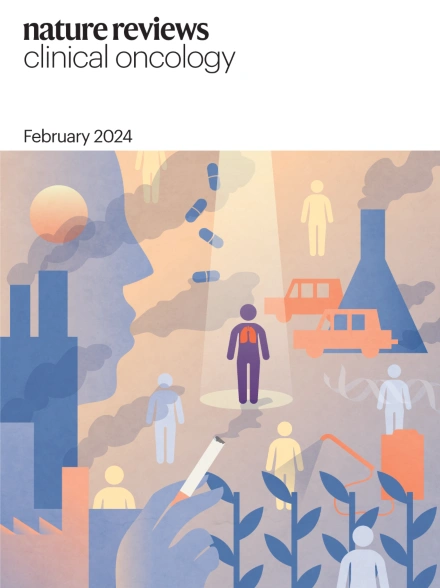Clinical relevance of extracellular vesicles in cancer - therapeutic and diagnostic potential.
IF 82.2
1区 医学
Q1 ONCOLOGY
引用次数: 0
Abstract
Extracellular vesicles (EVs) encompass a multitude of lipid bilayer-delimited particles, of which exosomes are the most widely studied. Bidirectional cell-cell communications via EVs have a pivotal role in the physiology of multicellular organisms. EVs carry biological cargoes (including proteins, RNA, DNA, lipids and metabolites) capable of mediating a range of pleiotropic cellular functions. Over the past decade, EVs released by cancer cells (onco-EVs) have been shown to promote cancer progression including tumour outgrowth and metastatic dissemination. Furthermore, the innate ability of EVs to protect vulnerable molecular cargoes (such as RNA, DNA or proteins) from enzymatic degradation, their presence in most biofluids and the ability to transverse biological barriers to reach distant organs make them ideal targeted drug delivery systems, including in patients with cancer. Many of these properties also support investigations of EVs as biomarkers with potential roles in both diagnosis and treatment monitoring. In this Review, we describe advances in the development of EVs as cancer therapeutics or biomarkers, including cancer vaccines, targeted drug delivery systems and immunotherapies, as well as potential roles in early cancer detection, diagnosis and clinical management. We also describe the potential of emerging technologies to support further discoveries as well as the clinical translation of EVs into diagnostic and therapeutic clinical tools. We highlight the potential of single-EV and onco-EV detection and discuss how advances in multi-omic and artificial intelligence-enabled integration are providing new biological insights and driving clinical translation.细胞外囊泡在癌症治疗和诊断中的临床意义。
细胞外囊泡(EVs)包含许多脂质双层分隔的颗粒,其中外泌体是研究最广泛的。通过电动汽车进行的双向细胞间通讯在多细胞生物的生理中起着关键作用。电动汽车携带生物货物(包括蛋白质、RNA、DNA、脂质和代谢物),能够介导一系列多效性细胞功能。在过去的十年中,癌细胞释放的ev (onco- ev)已被证明可以促进癌症的进展,包括肿瘤的生长和转移性传播。此外,电动汽车天生具有保护易损分子货物(如RNA、DNA或蛋白质)免受酶降解的能力,它们存在于大多数生物流体中,并且能够跨越生物屏障到达远处的器官,这使它们成为理想的靶向药物输送系统,包括癌症患者。许多这些特性也支持了ev作为生物标志物在诊断和治疗监测中的潜在作用的研究。在这篇综述中,我们描述了ev作为癌症治疗或生物标志物的发展进展,包括癌症疫苗、靶向药物输送系统和免疫疗法,以及在早期癌症检测、诊断和临床管理中的潜在作用。我们还描述了新兴技术的潜力,以支持进一步的发现,以及将ev临床转化为诊断和治疗的临床工具。我们强调了单ev和双ev检测的潜力,并讨论了多组学和人工智能集成的进展如何提供新的生物学见解和推动临床转化。
本文章由计算机程序翻译,如有差异,请以英文原文为准。
求助全文
约1分钟内获得全文
求助全文
来源期刊
CiteScore
99.40
自引率
0.40%
发文量
114
审稿时长
6-12 weeks
期刊介绍:
Nature Reviews publishes clinical content authored by internationally renowned clinical academics and researchers, catering to readers in the medical sciences at postgraduate levels and beyond. Although targeted at practicing doctors, researchers, and academics within specific specialties, the aim is to ensure accessibility for readers across various medical disciplines. The journal features in-depth Reviews offering authoritative and current information, contextualizing topics within the history and development of a field. Perspectives, News & Views articles, and the Research Highlights section provide topical discussions, opinions, and filtered primary research from diverse medical journals.

 求助内容:
求助内容: 应助结果提醒方式:
应助结果提醒方式:


